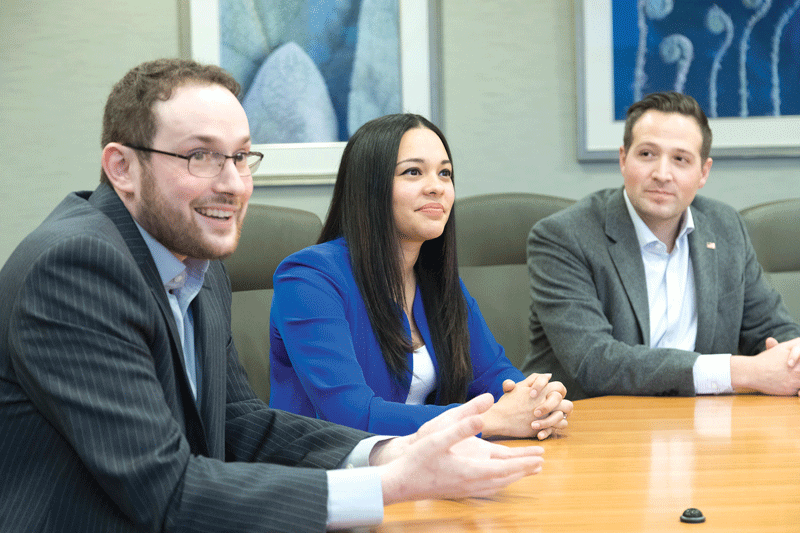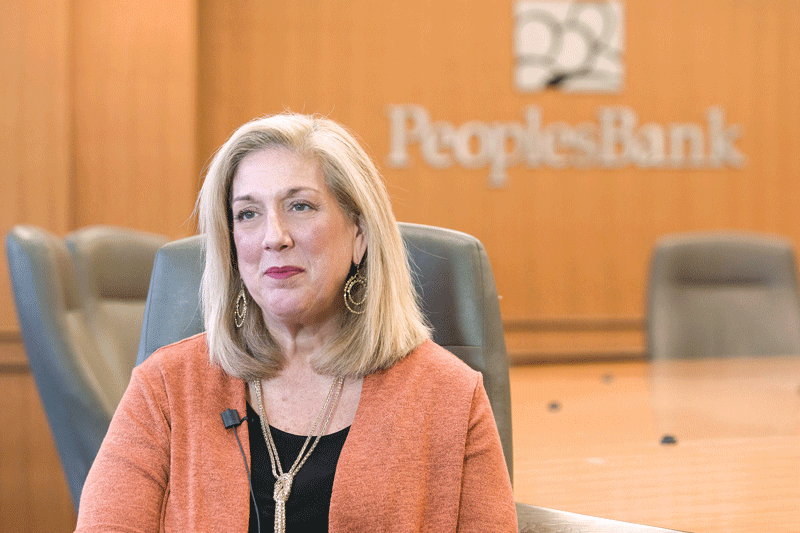PeoplesBank Retains Young Talent by Keeping Employees Engaged
Value Proposition

From left, Phil Michaud, Alisa Feliberty, and Robert Raynor say PeoplesBank’s efforts to keep young professionals engaged with the company’s values and connected to the community are among the qualities their generation values in an employer.
It’s difficult to pigeonhole the Millennial generation — though many have tried — in terms of what they want in a job and a workplace.
But one recurring theme is a sense of purpose and meaning, one that goes beyond their list of duties. And on this front, employers are largely falling short.
In fact, according to a recent Gallup study, “How Millennials Want to Work and Live,” only about one-third of young professionals strongly agree that the mission or purpose of their organization makes them feel their job is important. And just 40% feel strongly connected to their company’s mission. This is a problem, the study notes, that leaders need to take seriously because Millennials currently make up 38% of the U.S. workforce, and that percentage will continue to rise.
They might do well to listen to three Millennials whose employer, PeoplesBank, seems to understand what makes them tick.
“As an employee, I feel appreciated, I feel heard, like my opinion actually matters,” said Alisa Feliberty, call center manager. “That’s a big thing for me, knowing I’m not just a body here, but a person considered for her thoughts and beliefs.”
Phil Michaud, a loan service associate, recalled being part of a meeting in which top bank officials candidly outlined their growth strategy for the next decade. “Having that kind of access to the direction the company is looking to grow, getting into the nitty gritty of all that, says they value you, and you’re worth telling.”
Then there’s Robert Raynor, who stumbled into banking after studying business management in college.
“I’d say the biggest thing for me is connection to the community,” said Raynor, now assistant vice president of Compliance. “To be able to work for a company that reaches out to the community, that makes a positive impact in the community and makes a difference, you know you’re working to help out the less fortunate in your area, not just coming in and making a widget and making a profit.”
These opinions aren’t happy accidents, said Janice Mazzallo, the bank’s chief Human Resources officer, but part of an overall strategy to create a culture that draws and retains top talent by making sure they feel connected.
“Values is something we get right in the organization,” she said. “Attracting Millennials isn’t just about having the right employee benefits, though we do that. We also recognize that Millennials — and all employees, for that matter — want to connect; when they go to work, they want to feel engaged, that what they do matters.”
List of area Employment Agencies
These efforts have drawn the attention of the Boston Globe, which has named PeoplesBank among its Top Places to Work five years running — in fact, the only company based in Western Mass. to be named to the most recent list.
“We put a lot of energy into that effort, and we don’t take it for granted,” Mazzallo said. “But it’s also not something that HR does in a vacuum.”
Rather, creating a workplace culture that keeps employees engaged and committed to the brand is an effort that requires buy-in across the organization. For this issue’s focus on employment, BusinessWest explores why PeoplesBank’s leaders feel the effort is worth it.
Making Connections
The benefits of engaging Millennials extends far beyond accolades in a magazine. In the coming years, employers must learn what makes this large, diverse group tick if they want to retain top talent.
The Gallup survey found that 67% of Millennials are engaged at work when they strongly agree that the mission or purpose of their company makes them feel their job is important. In contrast, just 14% are engaged when they strongly disagree with this statement. Because engagement leads to increased retention, fostering a connection to purpose can help companies fight Millennials’ propensity for job-hopping.
“When a company’s purpose is evident through its culture and brand, Millennials are better able to connect it to their role,” write Brandon Rigoni, associate director for Selection and Development at Gallup, and Bailey Nelson, a writer and editor at the polling company. “Leaders should strategically align the company’s purpose, brand, and culture to create an environment in which mission is something employees experience daily. By integrating purpose company-wide, leaders give employees the opportunity to own the company’s mission and transform it into enhanced performance.”
The values PeoplesBank tries to espouse, Mazzallo said, range from an extensive volunteerism culture to environmental awareness (which takes the form of an active committee that seeks out ways to make the bank and the surrounding community ‘greener’); from technological innovation to an emphasis on work-life balance.

Janice Mazzallo says creating a culture that has earned multiple ‘Top Places to Work’ accolades starts at the top but includes input across the organization.
“I think the fact that we’re an employer that cares about our community and gives employees opportunities to get involved in the community — whether it’s volunteerism or board involvement or the social aspect — that’s certainly important to them,” she went on. “We have a lot of opportunities here to get involved.”
The bank’s employee-driven committees tackle everything from wellness and the environment to organizing social events, such as bowling outings and trivia nights. A popular annual event called Employee Fest is another opportunity to make workers feel connected and appreciated.
“Everyone looks forward to Employee Fest; it’s a week where the company kind of caters to you, but you also realize how everyone contributes to our success,” Felberty said.
Michaud agreed, noting that various departments compete in contests, and it’s good to see people, especially those in far-flung branches, he doesn’t talk to on a regular basis. “At face value, it looks like we’re playing games, but I think about the connections we’re making and what that does for everyone in the bank. It’s more about building community and building relationships in this place where we spend the majority of our time.”
None of these efforts — the events or the committees — would happen if they didn’t have support at the top, Mazzallo stressed. “We have a senior management team that believes strongly that this is important, and support the idea that people want to feel engaged, and without that engagement, the high performance doesn’t come. We know that; we’ve seen it. Our financial performance over the last five years has been phenomenal, and that’s no coincidence — we have highly engaged employees.”
Getting Ahead
The three young professionals we spoke with also praised the company’s advancement efforts, from its management-development program to its support of continuing education and a willingness to move people around if they desire a new challenge.
“Management here supports us and allows us to take time to develop our skills,” Michaud said. “I started off as a less-than-part-time teller, and in a short period of time, I made this position. The opportunities are definitely there. You see people moving up in departments and transferring between them. If you find it’s not a great fit or you’re interested in something else, they’ll move you to another department.”
Feliberty agreed. “They’re interested in making sure you’re happy and successful. It’s important for them to retain you as an employee, and they’d rather move you from one department to another than keep you stagnant in one position.”
That flexibility is married, they added, to encouragement by bank leaders to communicate their goals and ambitions.
“I’m always surprised at the open doors to communication,” Raynor said. “I’ve had the opportunity to sit down with the then-CFO — now president — and talk about my career path, and what my interests are. With that busy schedule, to take time to sit down and talk about my thoughts and plans is pretty amazing to me. You don’t hear about that taking place that often.”
Michaud agreed, citing coffee events held with senior officials, who share their own paths to success. “The feeling is, they’re looking for you to ask questions and discover your own path to success, and then give you the tools to do that. They’re incredible at that. They’re giving you confidence that they’re here for you — you’re not on your own here.”
Added Raynor, “it’s not a canned message. It’s, ‘this is my story, this is what happened — the obstacles I faced, what happened in my personal life that helped me make this decision or that decision.’ It’s incredibly helpful.”
It’s also not the way most companies operate. According to the Gallup survey, only 26% of millennials say that, in the past seven days, they have heard someone talk about how their daily work connects with their organization’s mission and purpose. And just 34% of millennials report that they have heard a story in the past 30 days about how their company impacted a customer to improve their business or life.
PeoplesBank’s openness, Raynor added, breeds pride in the company and one’s place within it, which suppresses the natural urge to believe the grass is greener somewhere else. “Being at a place like Peoplesbank and having those conversations, I know where the grass is greener, and that’s a pretty good feeling.”
Just a Little Respect
Mazzallo called on one more word to describe the workplace culture at PeoplesBank: Respect.
“I’ve worked for a lot of organizations in my life, and there’s something about this bank that, I think, leads with respect. When you have that in place, there are so many lessons that can be learned,” she told BusinessWest. “When we have strategic initiatives, we want to hear from every level of the organization … I think there’s a healthy respect for the people who are directly involved in day-to-day projects.”
Feliberty said young employees definitely want to be heard. “It’s important to feel we’re included, that we matter, that what we think is considered when making decisions.”
There’s also a healthy regard for trying new ideas that arise from those discussions, Mazzallo said, whether it’s a new product or a new technological innovation.
“It’s OK to make mistakes,” she said. “I don’t think a lot of employers will say that. But if you want to have an innovative organization, you have to take risks — smart risks. I think people feel they can be creative and take risks, and, as a result, some very, very innovative ideas have been created.”
Like the brainstorm, cultivated over time, that clearly communicating the company’s values — and making employees feel connected to those values — will not only keep them around, but motivate them to new heights.
Joseph Bednar can be reached at [email protected]





